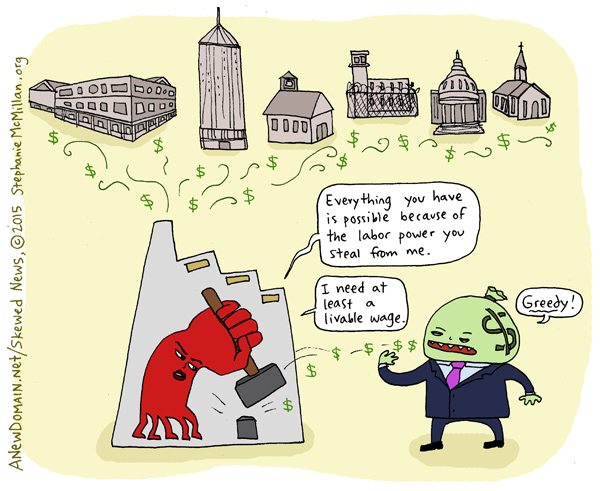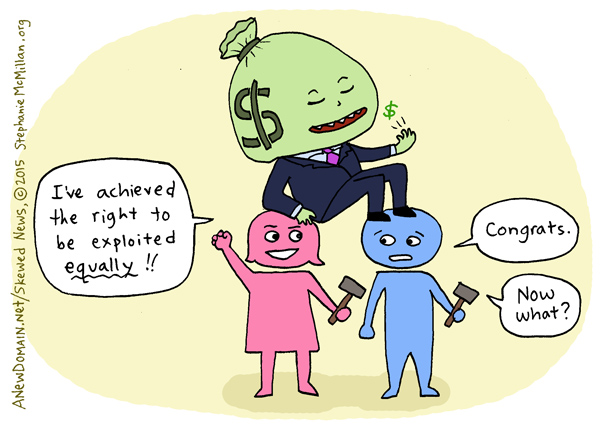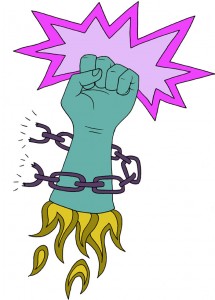[edited 5/10/11: added #42, combined #23 & #26. Edited again 5/13: added #31, combined #26 and #27, changed wording of #35]
by Stephanie McMillan
The people of the United States are currently unprepared to seize a revolutionary moment. We must fix that.
How can we raise our levels of revolutionary consciousness, organization and struggle?
Raise consciousness
1) Raise consciousness with the purpose of building organization and raising the level of struggle.
2) Investigate before forming opinions. Research how the world and the system function.
3) Read foundational and historical works about revolution, by those who have participated in and led them.
4) Analyze the system’s current condition and trajectory.
5) Learn about the resistance, uprisings and revolutions going on in the world today.
6) Read the material that currently active groups are issuing and discussing.
7) Continuously develop, elaborate upon and refine principles, theories and strategies for our movement.
8. Raise our voices. Articulate revolutionary ideas, and give them a public presence.
9) Listen and speak in the spirit of mutual clarification.
10) Participate in discussion, to develop our ideas and hone our skills in expressing them, and to help others do so.
11) Figure out how to use all our various talents, positions, energy and resources as effectively as possible, to expose the system’s evil, irredeemable and unreformable nature.
12) Analyze and explain the many ways the system dominates and exploits.
13) Stand with the dominated, exploited, invaded, colonized, threatened and oppressed.
14) Display a revolutionary spirit and celebrate it in others.
15) Exercise patience in winning over reluctant potential allies and supporters.
16) Ridicule and discredit the enemy.
17) Create revolutionary culture. Make videos and art, speak, sing, and write blogs, books, comments, leaflets, rhymes, stories, and articles about the enemy’s crimes and the people’s resistance.
18) Exchange ideas locally, nationally and (within the law or safe channels) globally.
19) Encourage others to participate in the revolutionary process.
Organize
20) Organize as a way to raise consciousness more broadly and to build struggle.
21) Start with people we know.
22) If our friends discourage us, make new friends.
23) Network sensibly with people online. Find local people online who express similar ideas, and meet with them.
24) Find a group that we basically agree with. Work with it.
25) If there’s no local group we want to work with, start one.
26) Write a leaflet with contact info. Pass it out in public to find potential comrades.
27) When we meet people, assess our points of agreement. If we agree on basic essentials, decide how to work together. If not, say goodbye for now.
28) Build strong ties locally and nationally, and build solidarity globally.
29) Define allies according to overall outlook and goals.
30) Don’t let secondary differences prevent cooperation. Handle differences between allies non-antagonistically.
31) Do not tolerate oppressive (sexist, racist, homophobic etc.) dynamics within the movement. Confront their expression and put a stop to it.
32) Refrain from saying anything aloud, on the phone or electronically that we wouldn’t want to hear played back in court.
33) Keep illegal drugs away from our political life.
34) Research and practice good security culture.
35) Prioritize the wellbeing of our organizations over personal benefit.
36) Ready our ranks to seize on any breaks in the legitimacy of the system.
Struggle
37) Use struggle to spread revolutionary consciousness and build organization.
38) Collectively determine what we want, and declare our demands.
39) Act as far as possible within our capacity, not either beyond or below our capacity.
40) Continuously strive to expand and consolidate our capacity and strength.
41) Assert our rights and our responsibilities.
42) Bring our revolutionary perspective into struggles already occurring.
43) Defend, support, and encourage our allies.
44) As opportunities arise, weaken the enemy and its ability to rule.
45) Obey the small laws. Don t get taken out of the game for something unworthy.
46) For illegal acts, make sure you can trust your comrades with your life and the lives of everyone connected to you.
47) Avoid being distracted and diverted into symbolic action-for-action’s sake.
48) Don t expect the enemy to act against its nature. It has no mercy and can not be reasoned with.
49) Turn every attack by the enemy into an opportunity to speak out, organize, and grow more powerful.
50) Be willing to work hard. Be smart. Be brave. Remember we’re all in this together.
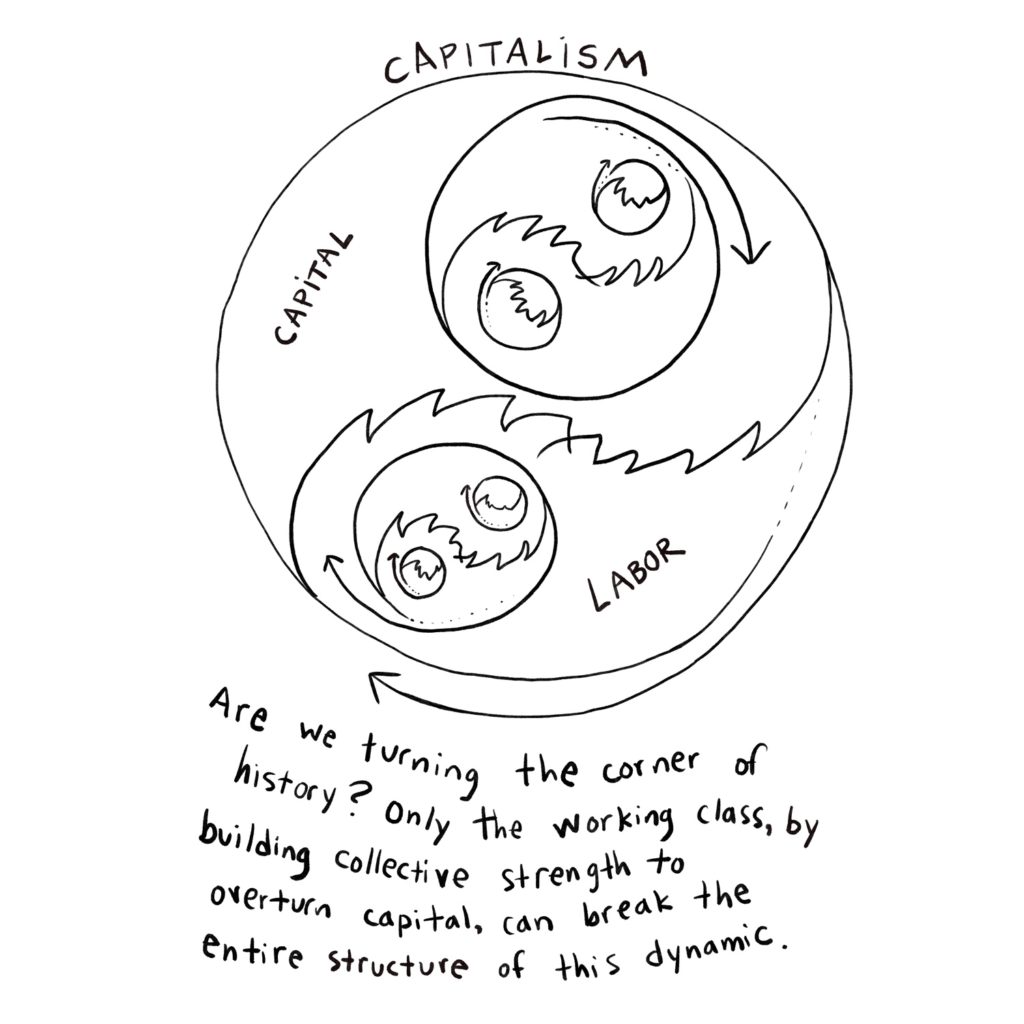


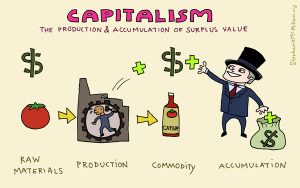
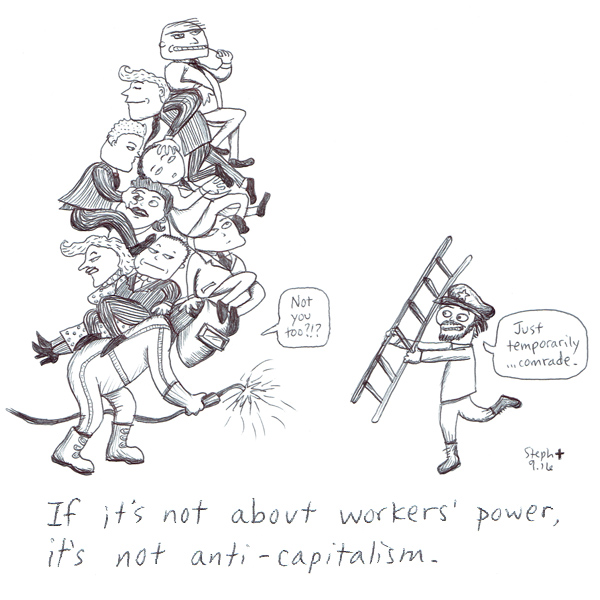 9/20/16
9/20/16
 Capitalism, even in deep crisis, will never cease struggling to adapt and grow. It will not collapse or dismantle itself, until it destroys the planet and everyone on it. So it falls on us to destroy it. In destroying capitalism, we construct something new. Revolution is the total transformation of the way everything is produced, the social relations of domination that go along with it, and the ways of thinking that keep us trapped.
Capitalism, even in deep crisis, will never cease struggling to adapt and grow. It will not collapse or dismantle itself, until it destroys the planet and everyone on it. So it falls on us to destroy it. In destroying capitalism, we construct something new. Revolution is the total transformation of the way everything is produced, the social relations of domination that go along with it, and the ways of thinking that keep us trapped.